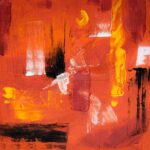Unveiling “Lo Salvaje”: More Than Just Wild
Ever felt that primal pull, that urge to break free from the everyday and connect with something untamed? In Spanish, “wildness” goes beyond the simple translation of “estado salvaje.” It’s a world of words that capture the raw, unbridled essence of nature, emotions, and even the human spirit – a linguistic adventure into the heart of “lo salvaje.”
Beyond the Basics: Painting a Picture of the Untamed
Describing a raging storm in Spanish? You wouldn’t just say “windy,” right? Spanish offers a palette of words to paint a vivid picture:
- Furia: The raw, uncontrollable force of a hurricane or raging fire.
- Desenfreno: A party without rules, where people dance with abandon – a wild lack of restraint.
- Extravagancia: Something bold, unusual, even over-the-top, like a wild costume or flamboyant celebration.
These words don’t just describe something wild—they make you feel it.
Beyond Words: Wildness Woven into Spanish Culture
“Wildness” is ingrained in Spanish culture, from captivating stories to vibrant art:
- Storytelling: Famous Spanish authors used “lo salvaje” to explore freedom, passion, and humanity’s struggle against nature’s power.
- Art: Paintings by Spanish masters capture the untamed beauty of nature – from vast landscapes to the raw energy of a bullfight.
- Folklore: Traditional stories and legends brim with “wild” characters and creatures, often embodying cultural beliefs about untamed forces in the world and within us.
Beyond the Literal: When “Wild” Takes on a Life of Its Own
Spanish uses “salvaje” and related words to describe experiences and emotions beyond the physical:
- Untamed Emotions: A surge of anger, a rush of passionate love, an overwhelming joy – these powerful feelings can be “salvaje”– raw, intense, and difficult to control.
- Unforgettable Experiences: A crazy night out, a heart-pumping adventure, a life-changing journey – all could be “salvaje” – experiences that push boundaries and leave a lasting impact.
The Journey Continues: Uncovering New Meanings
Exploring “wildness” in Spanish opens doors to a deeper understanding of the language and culture:
- A Spectrum of “Wildness”: From the delicate beauty of a wildflower to the raw power of a hurricane, “wildness” exists on a spectrum. Recognizing these nuances enriches your understanding of the natural world and its perception in Spanish culture.
- Humans and the Wild: The relationship between people and “lo salvaje” is complex – the fear of nature’s power, the draw of its freedom, our impact on the wild, and how it shapes us.
- Beyond Words: Pay attention to how Spanish uses “wild” metaphorically, gaining insight into how the language expresses abstract ideas and emotions.
Embracing this journey into “wildness” in Spanish expands your vocabulary and offers a richer, more nuanced perspective on the Spanish-speaking world, connecting you with the language and culture on a deeper, more meaningful level.
Unleashing the Essence of “Wildness” in English
We’ve explored how “wildness” holds different meanings in Spanish. But what about English? It’s not just about wild places; it’s a feeling, an energy that goes beyond nature.
Imagine a child’s uncontrollable laughter – that’s wildness! Or someone questioning the rules – that’s wildness too! It’s that raw, untamed part in us, like a hidden fire.
English often refers to this as our “inner wild,” the part that follows instincts and embraces freedom. It’s the source of creativity, gut feelings, the things we sometimes forget as we grow up.
Ever heard someone called “wild” for being stubborn? Or maybe things are “running wild” when out of control? English uses “wildness” to paint vivid word-pictures.
Stories thrive on wildness! Poems praising majestic mountains, books about facing deepest fears – wildness inspires us, making us contemplate the untamed within ourselves and the world.
“Wildness” in English is more than a word; it’s an idea woven into our actions, feelings, and art. It’s that spark of something untamed within us all!
Beyond “Aventurero”: Unleashing the Slang Spirit of Adventure in Spanish
So, you want to talk about adventure in Spanish? Sure, “aventurero” is the literal translation, but to truly capture that adventurous spirit, you need to dive into the world of slang. Spanish slang, like a secret handshake, gives you a glimpse into the heart of the culture.
Ready to unleash your inner “buscavidas?” Let’s explore the colorful world of Spanish slang for adventurous:
“Arriesgado” – The Risk-Taker
This describes someone who embraces risk, someone who sees a warning sign and thinks, “Challenge accepted!” “Arriesgado” individuals push boundaries and dive headfirst into the unknown.
Example: “Mi amigo es muy arriesgado, siempre está buscando la próxima aventura.” (My friend is very daring, always searching for the next adventure.)
“Atrevido” – The Bold One
While “arriesgado” is about taking chances, “atrevido” is about facing them head-on with fearlessness. They’re the first to try a crazy stunt or speak their mind, even when it’s risky. Not reckless, just incredibly brave, and maybe a tad mischievous.
Example: “¡No seas tan atrevido! Esa roca parece muy alta para escalar.” (Don’t be so bold! That rock looks too high to climb.)
“Echado pa’lante” – The Go-Getter
These individuals radiate a “can-do” attitude. Proactive, always hustling, they never back down from a challenge. They’re a force of nature, constantly moving forward and making things happen.
Example: “Ella es muy echado pa’lante, estoy seguro de que tendrá éxito en su nuevo proyecto.” (She’s such a go-getter, I’m sure she’ll succeed in her new project.)
“Buscavidas” – The Resourceful Adventurer
“Buscavidas” are the ultimate improvisers. They might not always have a plan, but they always find a way. Resourceful, resilient, and always up for an adventure, even if it means going off the beaten path. They’re the MacGyvers of the Spanish-speaking world.
Example: “Mi abuelo era un verdadero buscavidas, viajó por todo el mundo con muy poco dinero.” (My grandfather was a true adventurer, he traveled the world with very little money.)
“Tronco” – The All-Around Awesome One
“Tronco” isn’t strictly about being adventurous, but it describes something (or someone) incredibly cool. It could be a daring activity, an unforgettable experience, or a person who embodies that adventurous spirit. It’s like saying “awesome,” “rad,” or “wicked”—a versatile expression of approval.
Example: “¡Ese viaje en motocicleta fue tronco! Tienes que ver las fotos.” (That motorcycle trip was awesome! You have to see the pictures.)
Regional Variations: A Word of Caution
Remember, different Spanish-speaking regions have their own unique slang. What’s cool in one place might get you funny looks in another. Always be mindful of your audience!
Mastering Spanish slang for “adventurous” is about more than just memorizing words; it’s about embracing the cultural nuances and expressing yourself with that unique flair. So go ahead, unleash your inner “aventurero” and explore the world with a little more “chispa”!
Decoding “Feral” in Spanish: More Than Just “Salvaje”
Translating “feral” into Spanish isn’t always straightforward. While “salvaje” is the go-to for “wild,” other words like “asilvestrado” and “fiera” add layers of meaning depending on what you want to convey.
“Fiera”: From Untamed Beast to Tenacious Soul
“Fiera” is particularly interesting because it embodies a fascinating duality:
- The Wild Animal: “Fiera” can refer to a wild animal, often conjuring images of powerful predators in their natural habitat.
- The Fearless Individual: In casual conversation, “fiera” can describe a person who exhibits incredible determination and fearlessness. Imagine a tough negotiator or someone who thrives under pressure – they might be called “fiera” as a mark of respect for their tenacity.
“Feral” Across Continents: A Tale of Two Meanings
Even within the Spanish-speaking world, the use of “fiera” differs, highlighting the language’s richness and regional variations:
- Latin America: “Fiera” is frequently used to praise someone’s skills, resilience, or determination. They view that untamed spirit as admirable, helping people overcome challenges.
- Spain: Spaniards primarily stick to the literal meaning of “fiera,” using it to describe wild animals.
Choosing the Right Word: Context is Key
To accurately translate “feral,” consider these nuances:
- “Salvaje” remains your safest bet for a general translation of “wild,” encompassing the core meaning of “feral.”
- “Asilvestrado” implies a process of becoming wild, often used for animals that were once domesticated but returned to a wilder state.
- “Fiera” holds a dual meaning, encompassing both wild animals and people who display remarkable tenacity and fearlessness.
- The figurative use of “fiera” is more common in Latin America, while Spain tends to stick with its literal meaning.
By understanding these subtle distinctions, you can confidently navigate the nuances of “feral” in Spanish, choosing the word that best fits the specific context and conveys the intended meaning.
Internal Links:
Did you know that whales can sneeze? It might sound strange, but it’s true! You can learn more about it if you whale sneezing.
Wilbur Soot, a famous YouTuber, has found himself embroiled in a controversy. If you want to know more about his latest drama, you can read more about it here.












2 thoughts on “Beyond Salvaje: Exploring the Untamed Depths of Wildness in Spanish”
Comments are closed.